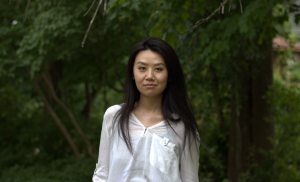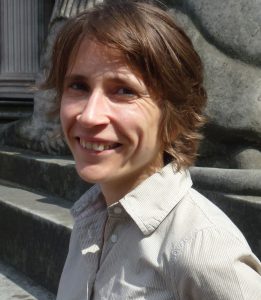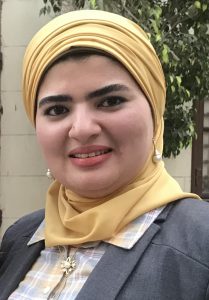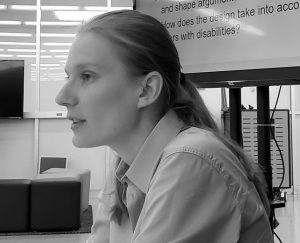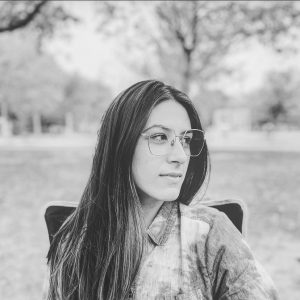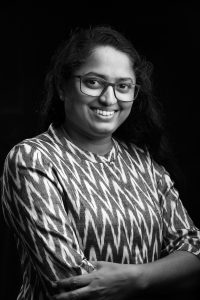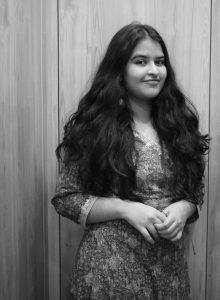At the annual conference of the Electronic Literature Organization (ELO), hosted by the Collegio Gallio of Como, ELO Board Member Erik Loyer announced the 2022 ELO Prize winners.
The Robert Coover Award for a Work of Electronic Literature
Winner: “ReRites” by David Jhave Johnston
Runner Up: “Travesty Generator” by Lillian-Yvonne Bertram
Honorable Mention: “Al-Barrah (البرَّاح)” by Reham Hosny and Mohamed A. Nasef
Committee: Deena Larsen, Madison McCartha, Illya Szilak
The Robert Coover Award for a Work of Electronic Literature honors the year’s best work of electronic literature, of any form or genre. It comes with a $1000 stipend. The Winner of the 2022 Award is “ReRites” by David Jhave Johnston.
According to the judges: “In this pandemic time, new forms of ritual have developed — people had zoom drinks and parties, and funerals were held via livestream. ReRites speaks to this.
In essence, the work is a documentation of the performance of the private ritual of writing and the obsessive-compulsive need for writers to communicate — even when no one else is reading. The work is generated through this neurotic compulsive repetition, linking it to both the pleasure principle and the death drive. It is not in an attempt to make perfect sense but to try and fail to make what is hidden, manifest. It is this, compulsive repetition above all that gives this work literal weight. 12 volumes worth. Profoundly, the author ends up communicating most poignantly not through words, but through a physical embodiment of those words. We feel the weight of his labor. It is a muscle memory. 120 hours of neural net text generation video! It is, let us be honest, mostly nonsense, punctuated occasionally by serendipitous wonder, when, impossible to predict! machine logic meets the ineffable logic of the reader as when ‘thunderous bismol’ trips deliciously off the tongue.
Jhave leans into the pleasure of performance by having poets read at superhuman speeds and by having human hands manipulate lines of poetry through gesture. Body and machine are linked, but this is not about being slave to that machine, but rather in re-discovering the peculiar pleasures of being embodied. Or, as Turing put it, in his seminal paper on artificial intelligence ‘Computing Machinery and Intelligence,’ we get to enjoy ‘strawberries and creme.’”
The Runner Up for the 2022 Coover Award is “Travesty Generator” by Lillian-Yvonne Bertram.
According to the judges, “Travesty Generator uses computational logic to create gut-punch poetry that speaks poignantly to the recent highly publicized racist killings at the hands of US law enforcement. Although the book’s method is not novel, the content – racial injustice in the US – applies pressure to the ways racism might function as an algorithm, and creates in the process a new precedent in computational poetry which has typically been a-political. Here, the relentless ill-logic of the machine replays the violence against black bodies in all the variety one would expect from a generative system.
The lack of personalized authorship is critical to the working of the poetry. We, the reader, are the bearers of meaning-making, memory, and feeling. We are the ones who bear witness. If we do not change the algorithm, the machine will spit out more. It is inevitable. It is programmed that way. The work itself reveals that the ‘print(list(permutations)))’ of ‘I can’t breathe’ are endless.”
Honorable Mention for the 2022 Coover Award is “Al-Barrah (البرَّاح)” by Reham Hosny and Mohamed A. Nasef.
According to the judges, “‘Al-Barrah (البرَّاح)’ by Reham Hosny and Mohamed A. Nasef (2021) deftly intertwines game, story, augmented reality, and social media for tales that also overlay a poetic commentary on oppression and voicelessness. Al-Barrah is the first paper novel to combine augmented reality and hologram technologies with Arabic language text inside the borders of a paper page to provide the reader with a unique experience, and immerse her in the narrative. The project is an amazing example of dedicated work over five years without institutional support. The work invites the reader in to answer questions such as memories of lecture halls, what autumn looks like, and what it is to leave your homeland far behind. The graphics invite readers into the story as a helmeted figure gazes and we move along her gaze into a story about the past and one about the present that converge in the middle. This unique and immersive experience has real-world implications, from AI to AR, from voiceless to voiced, from holograms to hidden depths.
The reviewers admit that we are necessarily viewing this work through a lens of cultural myopia. Though we appreciate the authors’ claim that this is a work of ‘activist e-lit (that) speak(s) up against injustice and give voice to those who have been deprived from their freedom just for practicing their right of freedom of speech,’ we do not know the tradition of protest through literature or poetry in the Arabic speaking world, nor do we claim to understand the political and cultural constraints the authors are operating under in creating this work, or the political and cultural ramifications this work might have. However, by asking readers to assist in the construction of the story, specifically through the creation of a DIY plastic viewing pyramid for holograms, the authors offer readers an opportunity to consider their responsibility and complicity in consuming other, more conventional, government-sanctioned, and societal narratives.”
The N. Katherine Hayles Award for Criticism of Electronic Literature
Winner: “Critical Making, Critical Design,” Issue 01 of The Digital Review, edited by Lai-Tze Fan
Runner Up: Twining: Critical and Creative Approaches to Hypertext Narratives by Anastasia Salter and Stuart Moulthrop (Amherst College Press)
Honorable Mention: Bitstreams: The Future of Digital Literary Heritage by Matthew Kirschenbaum (University of Pennsylvania Press)
Committee: Sarah Laiola, Viola Lasmana, Marisa Parham
The N. Katherine Hayles Award for Criticism of Electronic Literature honors the best work of criticism of electronic literature of any length. Endowed through a generous donation from N. Katherine Hayles and others, this annual prize recognizes excellence in the field. The Prize for 1st Place comes with a $1000 award. The 2022 N. Katherine Hayles award goes to “Critical Making, Critical Design,” Issue 01 of The Digital Review, edited by Lai-Tze Fan.
According to the judges, “‘Critical Making, Critical Design,’ edited by Lai-Tze Fan, is an exciting collaborative effort that reimagines and brilliantly presents the inseparability of theory and practice that is essential to the work and ethos of electronic literature. In judging, we were particularly struck by the ways these edited co-issues carve out critical space to think about processes of creative-critical work — necessary components to all critical work that, in the institutionally disciplined spaces of arts and humanities, are too often left in the ‘drafts’ folders. Finally, we are excited by the opportunity to offer the Hayles award to a work of e-literary scholarship that, as we have regularly argued about e-literary practice, resists traditions of thought that would set born-digital work as subordinate to print.”
Runner Up: Twining: Critical and Creative Approaches to Hypertext Narratives by Anastasia Salter and Stuart Moulthrop.
According to the judges: “Anastasia Salter and Stuart Moulthrop’s Twining foregrounds the multiple pathways writers, artists, critics, and students take into and out of Twine, the eminently flexible interactive text creation platform. Highlighting codework, implementation strategies, critical perspective, and pedagogical example, Twining takes the software seriously, and in so doing is able to highlight its deep importance to a broadly diverse and deep user community. In reviewing Twining, the committee was also struck by how the very form(s) of Salter and Moulthrop’s text, which includes a print edition, a digital open access edition, and a GitHub repository, reflects the ethos of access that defines Twine itself. Twining both describes and celebrates how e-lit lives in classrooms and pet-projects, in the work of developers and hobbyists, and for scholars and artists alike.”
Honorable Mention: Bitstreams: The Future of Digital Literary Heritage by Matthew Kirschenbaum.
According to the judges: “A critical and timely intervention in the intersections of e-lit, media archaeology, bibliography, and software and platform studies, Matthew Kirschenbaum’s Bitstreams thoughtfully and beautifully captures the techno-social aspects and material history of literary production, while always foregrounding the importance of history and memory. Highlighting various significant literary legacies through a forensic approach of their writing and textual production processes, Bitstreams is a necessary text and delightful read in electronic literature, material book studies, and literary history.”
The Marjorie C. Luesebrink Career Achievement Award
Winner: Alan Sondheim
Committee: Angélica Huízar, Jessica Pressman, Jody Zellen
The Marjorie C. Luesebrink Career Achievement Award honors a visionary artist and/or scholar who has brought excellence to the field of electronic literature and has inspired others to help create and build the field. Bestowed by the Electronic Literature Organization and funded through a generous donation, it comes with the following: a $1000 award that can go directly to the awardee or to a young scholar who would use the funds in support of developing content for online resources about the awardee’s achievements; a plaque showing the name of the winner and an acknowledgement of the achievement; and a one-year membership in the Electronic Literature Organization at the Associate Level.
The Artist or Scholar selected for this award should demonstrate excellence in four or more of the following categories:
- Creation of opportunities for younger scholars
- Publication of influential academic studies of electronic literature
- Practice-based artistic research in the field, with significant presentations and exhibitions of creative work
- Curatorial activities, particularly including editing and the organization of exhibitions, conferences, workshops, roundtables and research groups
- Preservationist work, whether individual or institutional
- Active participation in conferences and exhibitions, both national and international
- Contribution to ELO as an organization, whether as a member of the Board of Directors or Literary Art Board or as informal advisor
We are delighted to announce this year’s winner of the Marjorie C. Luesebrink Career Achievement Award, Alan Sondheim.
The judges offered the following celebration of Alan Sondheim:
“Alan Sondheim has had immense impact in broad and diverse ways, across aesthetics and disciplines, to produce what we now call “the field of electronic literature.” He helped to pioneer digital artistic practice for decades and continues to innovate, merging theory and praxis in creative-critical ways. He has dedicated his life to creating an established field through artistic creations, critical publications, and mentoring of junior makers/scholars. It should be recognized that he did this field-creating work from the position of independent artist, without institutional support. Sondheim is a steadfast presence at ELO, and his work and his commitment to the field– the people and organization in it– make him deserving of this field-building award.”
ELO awards these prizes at its annual conference. The call for next year’s awards will be issued months before via ELO’s website.

 At the ELO 2022 Conference, we announced the leadership transition from Leonardo Flores to Caitlin Fisher, as Flores completed his three-year term. Fisher, who had previously served as Treasurer and Vice President, assumed office on July 1. Along with that change, Rui Torres took on the role of Treasurer, and Mark Sample, the role of Secretary. Anastasia Salter continues in her role as Vice President.
At the ELO 2022 Conference, we announced the leadership transition from Leonardo Flores to Caitlin Fisher, as Flores completed his three-year term. Fisher, who had previously served as Treasurer and Vice President, assumed office on July 1. Along with that change, Rui Torres took on the role of Treasurer, and Mark Sample, the role of Secretary. Anastasia Salter continues in her role as Vice President.